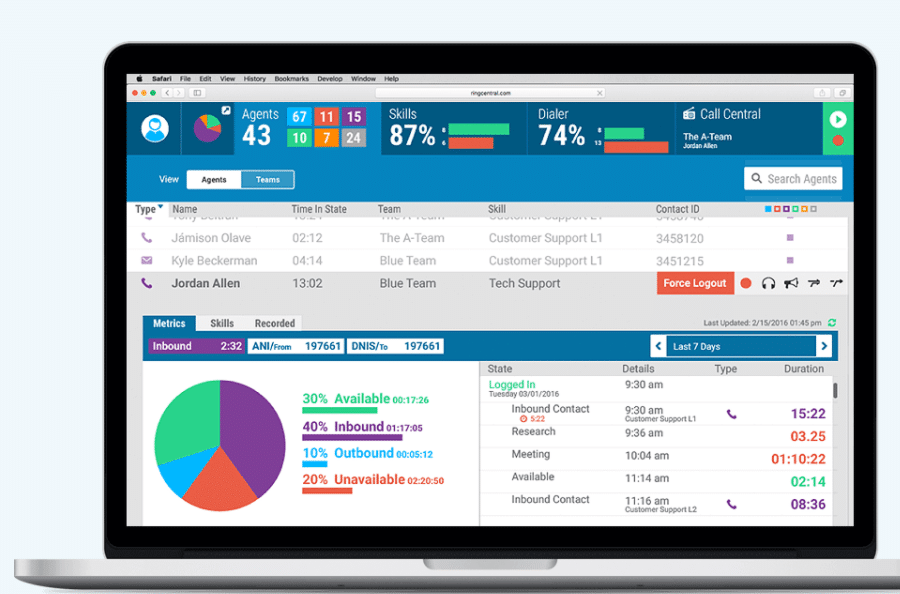Even with the rise of eCommerce, telesales remains a sales tactic for companies. It’s an area that business owners should have on their radar and utilise effectively.
When you have a high-quality team of reps, it can positively impact your bottom line and business development. From an employee’s perspective, it takes a lot of skill to excel at being a telesales representative. It’s not just about reading from a generic script written by your marketing manager. It takes way more than that to succeed.
Read on to find out what telesales can do for your company, what to look for in an employee and a selection of top telesales tips.
Let’s start by defining telesales.
What is telesales?
Telesales is not just cold calling, and it’s the act of selling a product or service via telephone. If you’re forging a career in telesales, your days will involve talking to potential customers on the phone. These conversations aim to encourage people to make a purchase.
Telesales combines communication and sales skills with customer service knowledge. And it falls into two categories: inbound and outbound.
With inbound telesales, representatives answer calls from potential and existing customers. Outbound telesales involves ringing prospects to generate sales.
Whether you’re receiving calls or phoning leads, you need a varied skillset – more on that later. It’s also important for businesses to invest in the right technology. Integrated solutions like RingCentral have features such as proactive outbound dialling that can support your telesales team.
By having a successful telesales team, your company builds quality customer relations that generate new and repeat business.
The difference between telemarketing and telesales

You may also have heard of telemarketing. Telesales and telemarketing are often used interchangeably, but they’re quite distinct. Telesales is a much older term and is specifically about selling products or services. Telemarketing is a form of direct marketing that generates new customers – it’s more about building leads than sales.
Telemarketing is carried out via the telephone. But rather than selling something, the agent is creating opportunities and generating leads. Telemarketers put your business on a prospect’s radar, providing them with product information. They also conduct market research and survey customer satisfaction.
For example, let’s say you own healthcare business. Your telemarketers may create leads by calling potential customers to let them know about a herbal supplement launch. The telesales team then calls the leads most likely to make a purchase.
Telemarketing is a way of letting people know what your company offers. It’s a chance to build a relationship between the customer and your business.
It’s an important cog in a business wheel and can:
- Build interest in your brand
- Identify leads for your sales team
- Glean info from existing customers regarding buying trends
- Obtain customer feedback
- Promote new products and offers to customers
The life of a telesales executive is made easier by the work of telemarketers.
What can telesales do for your business?

So, the telemarketing team has done the groundwork. They’ve gathered data from lots of potential customers and gone ahead with qualifying leads and appointment setting.
What next? A sales executive calls these prospective leads and pushes for a sale. Ultimately, they make your business money.
As for inbound calls? Reps convert leads by talking to potential and existing customers who have called your business. These sales leads are sometimes called “warm leads” because the prospect already has an interest in your business – they’ve phoned you.
A great telesales team increases conversion rates. And that can only be good for business.
What’s more, telephone-based telesales teams lower costs for your business. How? A successful remote team means fewer field representatives are required, and travel costs fall.
Of course, you need to keep in mind that telesales reps have a tricky job. They’ll often have to deal with difficult leads – not all opportunities are easy to convert.
Telemarketing and telesales go hand in hand and are both beneficial to your business. The teams work strategically together, whether in-house or outsourced. And both put the customer first.
But telemarketing and telesales only produce results when you have professional, expert teams.
Duties of a telesales representative

As well as closing deals and making sales, an effective telesales agent ensures customers are satisfied. High-quality customer service is key.
Research shows that 78% of consumers have cancelled a purchase because of subpar customer service. To help your agents provide the best service, technology is vital. For example, let’s say employees work full-time in a call centre. Consider supporting them by investing in tech such as an omnichannel cloud contact centre.
With excellent customer service, the chances of a customer buying more products and services in the future increases. And when repeat business such as that occurs, telesales executives should use it as an opportunity to cross-sell.
It’s important to note that offering first-rate customer service during sales conversations comes with the telesales role. But the primary function of telesales is to sell. Unrelated queries such as tech support requests will be fielded to a customer support team.
Although telemarketers generate leads for telesales, the telesales team does sometimes generate sales leads via cold calls. They pre-qualify leads, too. Who for? The field sales team. The groundwork is laid for the field sales team to convert the leads in person. Some prospects are best dealt with face-to-face.
Another facet of the telesales role is order processing. Reps also create and update reports covering areas such as the number of calls and sales made. To help them stay organised, consider implementing a customer relationship management (CRM) system to streamline processes, control data flow, and improve communication.
The role of an agent is often target-based, meaning there are goals to hit each month and quarter. To achieve these goals, having certain skills is beneficial.
Skills a telesales representative must have

It requires particular skills to be an effective telesales agent. The role is different from that of a salesperson out in the field because it’s fulfilled via telephone. There are no physical meetings to persuade a prospect face-to-face.
There are a host of skills telesales representatives must possess to perform well and provide top customer service:
1. Communication
This is top of the list because a telesales rep won’t be successful without good communication skills. It’s as simple as that.
The role involves talking to strangers, so reading people via phone and adapting to their tone is vital.
It’s not just about talking clearly – although that is important – it’s also about explaining products and concepts in layperson’s terms.
Active (not passive) listening is vital, and so is being patient. Personalise the experience by listening to the potential customer’s concerns without interruption.
Linked to communication skills are interpersonal skills. These include the ability to build rapport with customers. Video conferencing can help with being able to connect to another person visually. However, it’s still a challenge to build an impression in the way you would face-to-face, so other techniques must be used. These include empathy and persuasion.
2. Sales experience
Part of the telesales remit is hitting quotas, so knowledge of the sales process will go a long way. Previous experience negotiating with and persuading potential customers is useful to possess, as is experience using call scripts.
3. Working knowledge of technology
There’s an array of top software out there for telesales teams to utilise. These range from CRM software to Voice over Internet Protocol (VoIP) systems. These solutions can enhance performance and increase productivity.
For instance, the benefits of RingCentral’s VoIP include cost savings, greater flexibility and ease of scalability. Sales reps can work anywhere, while their managers can still check in on their work via analytic tools.
So, being technologically savvy is a big plus for telesales jobs. Not only does it help telesales reps do their job better, but it also enhances the customer experience.
4. Conflict resolution skills

If a call gets dicey, telesales reps should remain even-tempered. They’re likely to come across unhappy customers at some point; remaining calm under pressure is crucial when that happens.
5. Speedy learning
Telesales reps require expert product knowledge, so fast learning is a necessary skill. Being able to explain a product or service to a potential customer is a vital skill. It’s the role of a telesales agent to educate the caller and answer questions fired their way.
Best and most trusted telesales tips
When a person receives a call from or phones an agent, they want a human, pleasant experience. They’d like quality customer service but also a productive conversation. There are a handful of useful pointers reps should keep in mind:
- Be personal.
It’s important to understand things from the prospect’s perspective. By identifying with them, it’s easier to offer a bespoke solution. And the chances of the prospect buying your product or service are higher.
- Persuade the prospect.
Does your telesales team know about sales psychology? If they have a grasp of it, it’s possible to influence and persuade a potential client. By identifying what’s important to the person and offering a way to help them achieve that, a telesales agent is on the right track.
- Don’t be afraid.
If fear comes across in a voice, that doesn’t leave a positive impression. A telesales person should radiate confidence, setting the caller at ease.
- Who’s the decision-maker?
Talking to the right person is essential. A telesales rep can have the best selling and conversion skills, but it doesn’t matter if they’re not talking to the decision-maker.

- It’s all about the opening.
Time is not on the side of a telesales agent. If a call doesn’t get off on the right foot, it’s likely to go downhill further or end abruptly. Charming a prospect is an integral part of the conversation. That should happen right from the start, establishing trustworthiness.
- Capture attention.
In the same vein, maintaining that charm is important. It keeps the customer engaged and willing to continue talking. To achieve that, foster a personal connection by actively listening. Inspire the caller with your measured responses and product expertise.
- Learn from objections.
It’s imperative to know how to deal with customer objections. By anticipating things they may be concerned about, responses can be cultivated, ready to use if and when the situation arises. In downtime, try to envisage possible customer objections and craft rebuttals. Say them out loud to see how they come across.
- Close the deal.
Everything we’ve said so far is useless if a telesales person doesn’t convert a lead into a sale. Having a personal chat, talking to the right person, and opening well is meaningless if the deal is not sealed. It’s not easy to master the art of closing. That skill comes with experience. But a good starting point is to understand the prospect’s personality.
- Leave a message.
If a prospect doesn’t answer the phone, all is not lost. Telesales skills can still be utilised by leaving a well thought out and persuasive voicemail. And it’s a sensible idea to follow up, too.
- Practice, practice, practice.
Over time, the skills of your telesales team will improve beyond what they already are. With more calls and experience comes tweaked and enhanced methods. And, in turn, more conversions and sales.
Telesales mastered
What have we learned? We know that telesales falls within telemarketing and involves selling a product or service via telephone.
Telesales representatives are responsible for converting leads into sales. As part of that, they must deliver excellent customer service. Beyond this, they fulfil several business functions, from reducing costs, providing a positive customer experience to creating leads for field sales teams.
It takes a lot of skill to be an effective telesales agent, from communication and persuasion to conflict resolution and patience. There are some top tips for telesales reps to keep in mind, from ensuring they’re talking to the right person to letting go of fear.
What’s more, the technology a telesales team uses has a big impact. See here for more info on how RingCentral can help with that.
Originally published May 24, 2021, updated Mar 13, 2024


